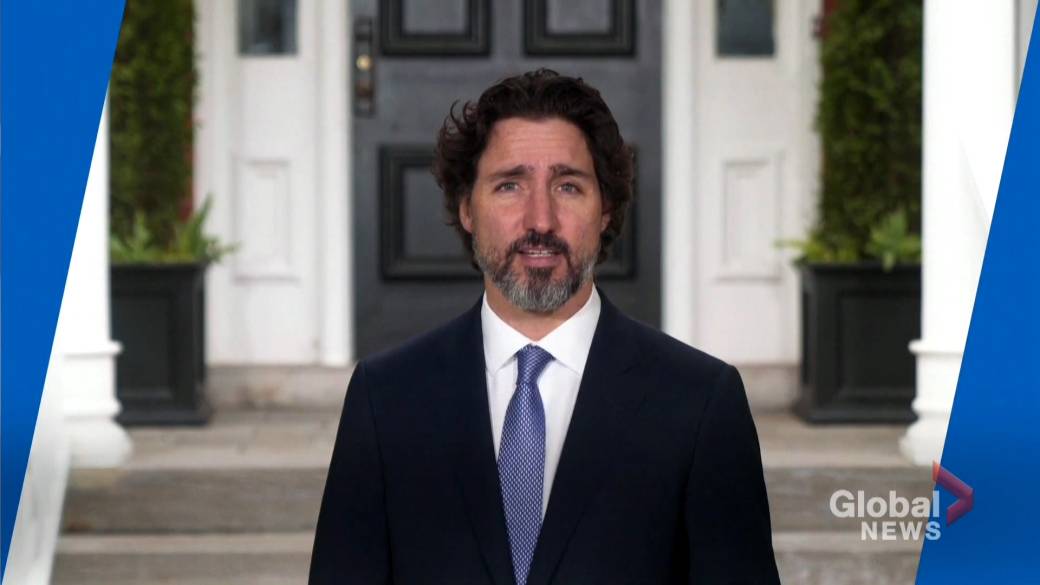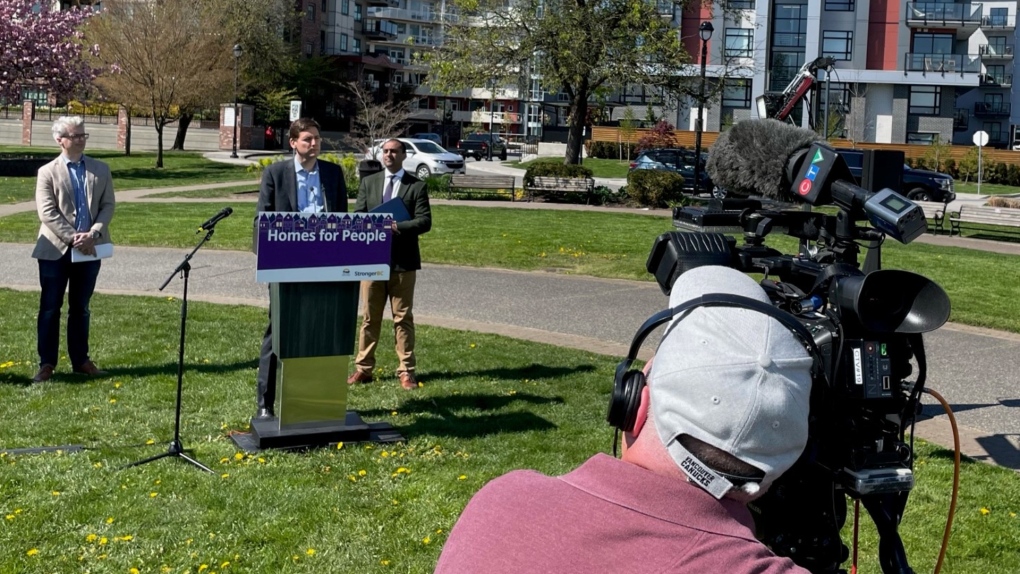Business
As rich nations prepare for coronavirus vaccine, others could be left behind: experts – Globalnews.ca

As the race for a vaccine against the new coronavirus intensifies, rich countries are rushing to place advance orders for the inevitably limited supply to guarantee their citizens get immunized first — leaving significant questions about whether developing countries will get any vaccine before the pandemic ends.
Earlier this month, the United Nations, International Red Cross and Red Crescent, and others said it was a “moral imperative” that everyone have access to a “people’s vaccine.” But such grand declarations are unenforceable, and without a detailed strategy, the allocation of vaccines could be extremely messy.
“We have this beautiful picture of everyone getting the vaccine, but there is no road map on how to do it,” said Yuan Qiong Hu, a senior legal and policy adviser at Medecins Sans Frontieres in Geneva. She said numerous problems must be resolved to manage distribution and that few measures have been taken.
In the past, Hu said, companies have often applied for patents for nearly every step of a vaccine’s development and production: from the biological material like cell lines used, to the preservative needed to stretch vaccine doses and even how the shots are administered.
“We can’t afford to face these multiple layers of private rights to create a `people’s vaccine,”’ she said, urging “very open conditions” so every manufacturer capable of doing so can produce a vaccine once its proven effective.
Speaking at a vaccine summit earlier this month that addressed the thorny issue of equitable distribution, Ghanaian President Nana Akufo-Addo agreed.
“The global spread of COVID-19 has told us in no uncertain terms that disease knows no boundaries and no country can afford to go it alone,” he said. “Only a people’s vaccine with equality and solidarity at its core can protect all of humanity from the virus. … A bold international agreement to this end cannot wait.”
Worldwide, about a dozen potential COVID-19 vaccines are in early stages of testing. While some could move into late-stage testing later this year if all goes well, it’s unlikely any would be licensed before early next year at the earliest. Still, numerous rich countries have already ordered some of these experimental shots and expect delivery even before they are granted marketing approval.
READ MORE:
Thousands worldwide volunteer for deliberate coronavirus exposure to speed up vaccine development
Britain and the U.S. have sunk millions of dollars into various vaccine candidates, including one being developed by Oxford University and manufactured by AstraZeneca. In return, both countries are expected to get priority treatment; the British government declared that if the vaccine proves effective, the first 30 million doses would be earmarked for Britons.
[ Sign up for our Health IQ newsletter for the latest coronavirus updates ]
Separately AstraZeneca signed an agreement to make at least 300 million doses available for the U.S., with the first batches delivered as early as October. In a briefing Tuesday, senior Trump administration officials said there will be a tiered system to determine who in America is offered the first vaccine doses. Tiers likely would include groups most at risk of severe disease and workers performing essential services.
Last week, the European Union moved to ensure its own supply. On Saturday, AstraZeneca struck a deal with a vaccines group forged by Germany, France, Italy and the Netherlands to secure 400 million doses by the end of the year.

Among several global efforts underway to try to ensure developing countries don’t get left behind is an “advance market commitment” from the vaccines alliance GAVI that aims to persuade manufacturers to make enough for both rich and poor countries.
That can “prevent countries from scrambling to try to invest,” said Seth Berkley, CEO of GAVI, which used the approach to secure Ebola and pneumonia vaccines for a global market. “Because if you’re investing in one or two vaccines, of course the … probability of those vaccines working is quite low. And so yes, you may hit the jackpot and have a vaccine that works. But you also may end up with no vaccine and be left behind.”
Two global vaccine groups have inked a $750 million deal with AstraZeneca to supply 400 million doses by the end of 2020. The Anglo-Swedish pharma giant has also agreed to license its vaccine to India’s Serum Institute for the production of 1 billion doses.
Johnson & Johnson’s chief scientific officer, Dr. Paul Stoffels, said the company plans to make its coronavirus shot for poor countries at a not-for-profit price, because of the complexity of the technology and expertise needed. Likewise, AstraZeneca CEO Pascal Soriot has pledged to make the vaccine available at no profit during the pandemic.
The World Health Organization and others have called for a COVID-19 “patents pool,” where intellectual property rights would be surrendered so pharmaceuticals could freely share data and technical knowledge. Numerous countries including Australia, Brazil, Canada and Germany have already begun revising their licensing laws to allow them to suspend intellectual property rights if authorities decide there is an overwhelming need given the pandemic.
But the response from the industry has been lukewarm.

Executives at Pfizer and some other major drug makers say they oppose suspending patent rights for potential COVID-19 vaccines.
Although vaccine stockpiles exist for diseases like yellow fever, cholera and meningitis, these are required only for a few developing countries during acute outbreaks. There is no precedent for divvying up vaccines that would arguably be needed by every country on the planet.
“We can’t just rely on goodwill to ensure access,” said Arzoo Ahmed, of Britain’s Nuffield Council on Bioethics, noting that precedents of how innovative drugs have been distributed are not encouraging. “With HIV/AIDS, it took 10 years for the drugs to reach people in lower-income countries. If that happens with COVID-19, that would be very worrying.”
Other experts pointed out that there are billions of dollars devoted to every stage of vaccine development, but little oversight over how the funds are spent and few guarantees the shots will get to those who need them most.
Suerie Moon, co-director of the Global Health Centre at the Graduate Institute Geneva, said it’s unclear how any vaccines meant for developing countries will actually be distributed. “We don’t know what the process will look like or how transparent it will be,” she said.
Dr. Soumya Swaminathan, WHO’s chief scientist, said the U.N. health agency is currently working on developing an “allocation framework” for how coronavirus vaccines should be given out. But this guidance would not be binding.
“We don’t want to be in a situation where there are doses of a vaccine but they’re just available to some countries,” she said. “We need to have a consensus on that so we can agree to share the vaccine in a way that protects the most vulnerable.”
Larson reported from Washington. Associated Press writers Danica Kirka in London, Lauran Neergaard in Alexandria, Virginia, and Linda A. Johnson in Fairless Hills, Pennsylvania, contributed to this report.
© 2020 The Canadian Press
Business
Short-term rental rules: Platforms could face $10K penalties in B.C. | CTV News – CTV News Vancouver


Short-term rental platforms that violate B.C.’s pending regulations can face administrative penalties of up to $10,000 per day, officials announced Thursday.
Investigations into non-compliant companies and individual hosts will be conducted by a provincial enforcement unit, which will launch once the new rules take effect on May 1.
The Ministry of Housing said daily penalties will range from $500 to $5,000 for hosts, depending on the infraction, and reach as high as $10,000 for corporations.
Speaking at a news conference in Langley, Premier David Eby reiterated that the purpose of the province’s regulations is to open up thousands of potential long-term housing units that are currently being offered year-round on apps such as Airbnb and VRBO.
“The commitment that we have as government is to ensure that the housing stock that we have – the homes that are actually built – are available for people who are looking for a place to live,” Eby said.
The premier acknowledged his family, like many others in the province, has benefited from the availability of short-term rentals, and stressed that those types of accommodations will not be banned outright next month.
But the government previously calculated there were 19,000 whole homes being used exclusively as short-term rentals last year.
“I can tell you there are 19,000 families and individual that are looking for a place to live … right now that are in competition with people who are looking to operate homes like hotels,” Eby said.
The upcoming regulations
Under the new rules, hosts can still rent out their primary residence, as well as one “additional unit, secondary suite or laneway home” on the same property, according to the ministry.
Those rules apply in every B.C. community with more than 10,000 residents, and to any others that opt in – as several already have, including Tofino, Pemberton, Osoyoos and Bowen Island. The rules will take effect in those smaller communities in November.
And once the regulations take effect, Housing Minister Ravi Kahlon stressed that guests themselves “will not face any fines.”
“We encourage people to continue to explore beautiful British Columbia, and stay in legal short-term rental accommodations,” Kahlon said.
Officials have recommended anyone planning to stay in a short-term rental on or after May 1 reach out to the host to confirm that the unit will be in compliance.
It’s unclear which violations will potentially cost platforms $10,000 per day. The government has said companies will be required to share user data to help municipalities and the province conduct their own enforcement, as the regulations also give local bylaw officers the ability to impose fines of up to $3,000 per day on hosts.
Platforms will be expected to remove listings from non-compliant users under some circumstances as well.
Airbnb touts economic benefits
The announcement from officials came hours after Airbnb shared an “economic analysis” estimating that the platform generated more than $2.5 billion in economic benefits across the province last year.
According to the company, for every $100 a guest spent on an Airbnb rental, they spent about $229 on other local goods and services.
“B.C.’s new short-term rental law is going to significantly impact the province’s tourism sector, just as peak tourism season arrives – taking extra income away from residents, limiting accommodation options for guests, and potentially putting at risk billions in tourism spending and economic impact,” Nathan Rotman, Canadian policy lead at Airbnb, said in a statement.
But officials have claimed the pending rules are already having a positive effect on housing availability – addressing a major crisis in the province – as former hosts choose to either become landlords or put their properties up for sale.
Kahlon said some companies, such as Expedia and Booking.com, have been “actively working to get ready for the coming changes,” and that he’s hopeful other platforms will follow suit by May 1.
Business
New rules take effect to rein in short-term rentals, deliver more homes | BC Gov News – BC Gov News


New short-term rental rules that will deliver more homes for people are set to come into effect on May 1, 2024, as the Province releases additional information to guide hosts, platforms and visitors through the changes.
“The effect of short-term rental apps like Airbnb, VRBO and others has been the loss of thousands of long-term rental homes in the midst of a housing crisis, driving up the cost of housing for British Columbians,” said Premier David Eby. “That’s why our government has created balanced new rules to crack down on speculators who are effectively operating mini hotels, while also ensuring homeowners can still rent out spaces in their principal residence. As we’ve already seen, these new rules are turning short-term rentals back into homes for people who live and work in our communities.”
The new rules are aimed at reining in the growing short-term rental market that is taking homes off the market. Analysis from short-term rental data analytics company AirDNA, from March 2024, shows that more than 19,000 entire homes in B.C. are being listed as short-term rentals for the majority of a calendar year. Data from a McGill University professor about short-term rentals in B.C. also shows in June 2023 that the top 10% of hosts earn nearly half of all revenue.
“We are in a housing crisis that requires strong action to deliver more housing for the people who live and work in our communities,” said Ravi Kahlon, Minister of Housing. “The changes passed last fall to tackle the growing short-term rental challenges are already bringing more long-term homes back onto the market. As the rules for hosts and platforms come into effect, we are taking another strong step to deliver more long-term homes for people in communities throughout B.C.”
The new rules that will take effect May 1, 2024, are:
- The Principal Residence Requirement, meaning short-term rentals can only be offered in the principal residence of a host, plus one additional unit, secondary suite or laneway home/garden suite on the property in communities where populations are greater than 10,000 people.
- The Principal Residence Requirement will function as a provincewide floor for communities with populations of more than 10,000 people, but local governments will still be able to use existing bylaws and introduce additional bylaws that are more restrictive.
- The Principal Residence Requirement will come into effect in more than 60 communities throughout B.C.
- Strata hotels and motels that have been operating in a manner similar to a hotel or motel before Dec. 8, 2023, and that meet select criteria moving forward, will be exempt from the Principal Residence Requirement.
- Non-conforming use of property will no longer apply to short-term rentals. Under previous legal non-conforming use protections, if an existing use of land or a building did not conform to the new bylaw, it would have generally continued with legal non-conforming use.
- Short-term rental hosts will be required to display a valid business licence number on their listing, where a business licence is required by a local government.
- Short-term rental platforms will be required to share data with the Province.
- Local governments can request that a platform remove listings that do not display a valid business licence.
In addition to the short-term rental rules going into effect, 17 communities initially exempt from the legislation have requested to opt in to the Principal Residence Requirement. For those communities, the new short-term rental rules will take effect on Nov. 1, 2024. A full list is included in Backgrounder 2.
A first-of-its-kind in Canada, the short-term rental data portal has been created to support local governments with monitoring and enforcement of short-term rental regulations and will allow local governments to have the platform companies remove listings that do not comply.
The Provincial Short-Term Rental Compliance Enforcement Unit, which will be phased in beginning May 1, will also be able to conduct investigations into alleged non-compliance, which may result in administrative monetary penalties and compliance orders. Administrative penalties for hosts breaking the rules can range from $500 to $5,000 a day per infraction, and up to $10,000 per day for corporations, depending on the infraction. Visitors and guests will not face any fines. The unit will also facilitate data sharing and requests to platforms to remove listings.
Visitors with stays booked after May 1, 2024, at short-term rentals are encouraged to check with their host directly to confirm the host is complying with their local government regulations and with B.C.’s new short-term rental rules.
Full requirements for hosts and platforms to comply with the new rules have also been released and are available in Backgrounder 1 and here: https://www2.gov.bc.ca/gov/content/housing-tenancy/short-term-rentals
Turning more short-term rentals into long-term homes is part of the Province’s Homes for People action plan. Announced in spring 2023, it sets out further actions to deliver the homes people need faster, while creating more vibrant communities throughout B.C.
Quotes:
Walt Judas, CEO, Tourism Industry Association of British Columbia (TIABC) –
“TIABC applauds the government for listening to the tourism sector and introducing regulations that will address housing shortages in visitor-dependent communities and give municipalities the tools they need to manage short-term rentals. From our perspective, the Province has found the right balance to provide more permanent homes for workers in tourism and other sectors, while also ensuring a range of accommodation options for visitors.”
Ken Sim, mayor of Vancouver –
“These short-term rental rules are vital in tackling the housing crisis not just in Vancouver, but across British Columbia. We’re eager to implement these new tools and collaborate with platforms to ensure short-term rentals in Vancouver align with these regulations. These measures lay the groundwork for a more sustainable and equitable housing landscape where Vancouver residents can thrive.”
Learn More:
To learn more about the rules that take effect May 1, 2024, visit: www.gov.bc.ca/ShortTermRentals
To learn more about government’s Homes for People action plan, visit: https://news.gov.bc.ca/releases/2023HOUS0019-000436
To learn about the steps the Province is taking to tackle the housing crisis and deliver affordable homes for British Columbians, visit: https://strongerbc.gov.bc.ca/housing
Two backgrounders follow.
Business
Gas prices surge in some parts of Canada. What’s causing pain at the pumps? – Global News
A sharp uptick in gas prices is fuelling road rage in some parts of Canada on Thursday.
Many motorists filling up at the pumps are facing higher prices — some up as much as 22 cents from yesterday in parts of Ontario, for instance.
Data from GasBuddy’s live gas price tracker shows prices were 10.9 cents higher across Ontario for an average of $1.73 per litre by 4 p.m. Eastern Thursday, as compared to the previous day’s average.
Prices for gas rose by a similar degree in Toronto, but in southwest Ontario towns such as Sarnia, GasBuddy says the cost of gasoline has jumped 22.3 cents to $1.79 per litre as of 4 p.m. Other Ontario municipalities near the U.S. border such as Chatham and Windsor also saw double-digit jumps in the price of gas.
Ontario Premier Doug Ford shared his frustrations about the gas price hike on Thursday. Analysts had predicted prices would rise overnight due to a changeover to summer gasoline blends from winter fuel.

“You go out last night and you’re sitting there for 20 minutes in the line up to get gas, you know, and it’s unacceptable. Everywhere I was going, it was about a buck, 59. You wake up this morning and it’s $1.80. You know, it’s absolutely disgusting,” Ford said during an appearance in Oakville, Ont.
Quebec drivers were also seeing prices rise on Thursday, with a hike of 7.5 cents taking the province’s average cost past $1.80 a litre, according to the gas data. Montreal gas prices hit an average of $1.88 per litre as of 4 p.m., an 8.9-cent hike from Wednesday.
“Of course it will have an impact on our budget. So for normal people, regular people, families, it’s going to be tough,” Montreal Mayor Valérie Plante said Wednesday ahead of the price surge.
Gas prices in British Columbia were meanwhile inching towards the $2 per litre mark, rising 1.4 cents to an average of $1.95 as of 4 p.m. Eastern.
Prices were also a few cents higher in Newfoundland and Labrador and New Brunswick on Thursday, but were largely steady in the other Atlantic provinces and in the Prairies.
Dan McTeague, president of Canadians for Affordable Energy, told Global News that Western Canada and some U.S. markets made the switch from winter to summer gasoline about a month ago. Those regions are tied to the Chicago comprehensive prices while most of Ontario’s prices are tied to what happens in the New York Harbour, which switched to the summer blend on April 16, he said.
Winter gas is cheaper than summer blends because it contains higher butane levels — an inexpensive but volatile element which lowers the cost of fuel, Patrick de Haan, head of petroleum analysis at GasBuddy, told The Canadian Press.
The cost of producing summer gas is higher because butane levels are reduced to meet Canadian environmental regulations and lower emissions.
Where do gas prices go from here?
On a national basis, the price of gas was on average $1.74 per litre as of 4 p.m. Eastern. That’s up 6.5 cents from Wednesday and 18.7 cents higher than the average in March, according to GasBuddy.
De Haan said Thursday that pump prices are expected to come down in July.
McTeague told Global News that where gas prices go from here depends in part on volatility in the Middle East, where attacks on any given day can send shocks into the global price of oil.
He said it’s unlikely for Ontario to hit $2/litre this summer, but those prices may be in the cards for Quebec. In much of Western Canada, “what you see is what you get,” with prices expected to hold around current levels, he said.
But for those who missed out on fuelling up before the overnight spike, McTeague also predicted gas prices would drop back another five cents in Ontario and Quebec on Friday.
Statistics Canada cited higher gas prices as fuelling a slight uptick in inflation last month, which accelerated to 2.9 per cent annually from 2.8 per cent in February. Prices were rising at a faster rate in Western Canada in March, StatCan noted.
Higher global crude oil prices are traced to geopolitical conflicts stymying production, the agency said earlier this week.
De Haan told Global News earlier this month that geopolitical strife like Russia’s war on Ukraine, more expensive summer gas, increased demand for summer travel and maintenance at refineries would keep prices elevated.
“It’s becoming more obvious that with every yearly increase, it’s becoming less and less likely that we would see a sub-dollar-a-litre-price,” De Haan told Global News.
Canada’s price on carbon also rose earlier this month, rising $15 to $80 a tonne in provinces that have adopted the federal regime. The hike was expected to add about three cents to the cost of gasoline for Canadians.
This past Monday, some Canadians living in provinces with the federal carbon price received the first quarterly rebate tied to the program.
– with files from Global News’ Jacquelyn LeBel, Gabby Rodrigues, Nathaniel Dove, Aaron D’Andrea, Kalina Laframboise and The Canadian Press
More on Money
© 2024 Global News, a division of Corus Entertainment Inc.
-



 Science7 hours ago
Science7 hours agoJeremy Hansen – The Canadian Encyclopedia
-



 Investment7 hours ago
Investment7 hours agoUK Mulls New Curbs on Outbound Investment Over Security Risks – BNN Bloomberg
-



 Health20 hours ago
Health20 hours agoSupervised consumption sites urgently needed, says study – Sudbury.com
-



 Tech6 hours ago
Tech6 hours agoSave $700 Off This 4K Projector at Amazon While You Still Can – CNET
-



 Sports5 hours ago
Sports5 hours agoAuston Matthews denied 70th goal as depleted Leafs lose last regular-season game – Toronto Sun
-
News20 hours ago
Canada's 2024 budget announces 'halal mortgages'. Here's what to know – National Post
-



 Tech5 hours ago
Tech5 hours ago'Kingdom Come: Deliverance II' Revealed In Epic New Trailer And It Looks Incredible – Forbes
-



 Science20 hours ago
Science20 hours agoGiant, 82-foot lizard fish discovered on UK beach could be largest marine reptile ever found – Livescience.com











